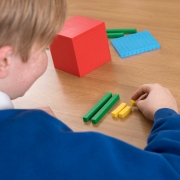Enhancing Primary School Math Education with Edx Education Base Ten Blocks
Mathematics lays the foundation for a myriad of critical thinking skills and problem-solving abilities that are essential for success in the modern world. In the realm of primary education, it is crucial to adopt teaching methods that foster a deep understanding of mathematical concepts from an early age. One such effective approach involves using tools like the Edx Education Base Ten Blocks, as advocated by renowned mathematics educator Dr. Paul Swan.
Dr. Paul Swan, a prominent figure in the field of mathematics education, has emphasized the significance of hands-on and visual learning techniques. His approach aligns seamlessly with the utilisation of the Edx Education Base Ten Blocks, a versatile tool that assists educators in imparting mathematical concepts in a tangible and engaging manner.
What Are Edx Education Base Ten Blocks?
Edx Education Base Ten Blocks are physical manipulatives designed to represent numerical values in a concrete way. The blocks are divided into four types: units (ones), rods (tens), flats (hundreds), and cubes (thousands). By manipulating these blocks, students can visualize and internalize the relationship between place value, addition, subtraction, multiplication, and division.
Concrete Learning for Abstract Concepts
Dr. Paul Swan emphasizes the significance of concrete learning in mathematics education. Many students struggle with abstract concepts because they lack a solid foundation in understanding the underlying principles. The tactile experience provided by Base Ten Blocks bridges this gap, as students can physically touch and move the blocks to comprehend concepts like regrouping in addition or subtraction.
For instance, when adding two-digit numbers, students can physically trade ten units for a rod, showcasing the concept of carrying. This hands-on interaction with mathematical operations transforms learning from a passive process to an active exploration, enhancing comprehension and retention.
Visualizing Mathematical Relationships
The power of visual aids in learning cannot be understated. Dr. Paul Swan and the Edx Education Base Ten Blocks both recognize this fact. The blocks allow students to see the connections between numbers, operations, and place value. By building and deconstructing numbers using the blocks, students develop a holistic understanding of how numbers relate to each other.
Imagine a multiplication problem: 3 rods (30) multiplied by 4 units (4). Students can physically lay out the corresponding blocks, count them, and observe the area they cover. This visual representation conveys the concept of multiplication as an area model, making the abstract idea more comprehensible. Interactive Base Ten from Dr Paul Swan.
Fostering Critical Thinking
Mathematics is not solely about calculations; it’s about critical thinking and problem-solving. Dr. Paul Swan’s approach, coupled with Edx Education Base Ten Blocks, nurtures these skills. Students are encouraged to explore various strategies to solve problems using the manipulatives.
When working on division, for example, students can distribute blocks into groups and observe how many rods or units are in each group. This process instils a deeper understanding of division as the inverse operation of multiplication. By experimenting with different arrangements, students develop flexible thinking, which is invaluable for tackling complex math problems.
Inclusivity in Mathematics
One remarkable aspect of Edx Education Base Ten Blocks is their inclusivity. These manipulatives provide a tangible platform for students with different learning styles and abilities to grasp mathematical concepts effectively. Whether a student is a visual, auditory, or kinesthetic learner, the blocks cater to diverse needs and preferences.
The Edx Education Base Ten Blocks offers a dynamic and enriching approach to teaching mathematics in primary schools, as championed by Dr. Paul Swan. Through hands-on engagement and visual exploration, students can develop a robust understanding of mathematical concepts that will serve as a foundation for their future academic pursuits. This approach not only enhances their mathematical skills but also cultivates critical thinking, problem-solving abilities, and a genuine appreciation for the beauty of mathematics. As we continue to shape the landscape of mathematics education, embracing innovative tools like Base Ten Blocks brings us one step closer to nurturing the confident and capable mathematicians of tomorrow.
Edx Education – Heather Welch



